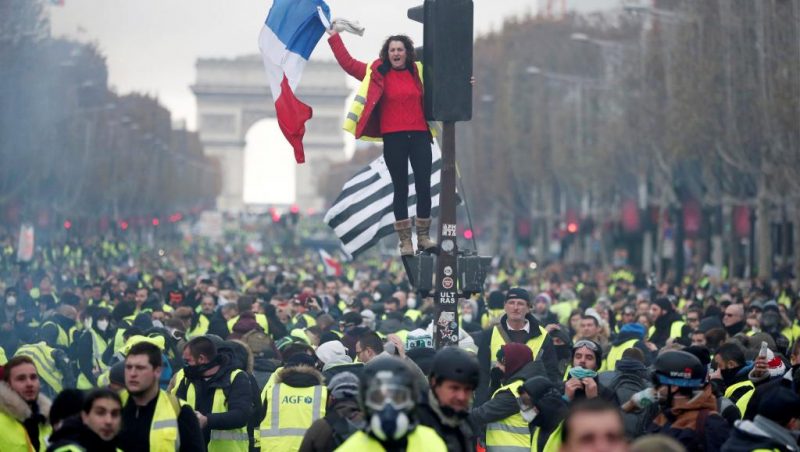
For several months the gilets jaunes (yellow vests) protests in France brought tens of thousands (in some cases hundreds of thousands) of frustrated workers to the streets every weekend in opposition to the left’s favorite green tax — the one on energy.
These demonstrations are spreading to other countries (see here, here, and here) and the media and the elites are doing everything they can to ignore this movement.
The movement represents a rejection of carbon taxation by voters from several different countries and different political backgrounds. A timeline of carbon taxation proposals from numerous politicians paints a clear picture of how everyday voters feel about carbon taxation. Time and again voters have rejected carbon taxation proposals from politicians from both sides of the political spectrum in numerous countries. Even liberal voters in Bernie Sanders’ Vermont vehemently rejected carbon taxation when Republican Phil Scott defeated pro-carbon tax Democrat Sue Minter in 2016, and more recently when voters in yellow vests showed up to their state legislature’s first session of 2019. The demonstration was intended to send a clear message to lawmakers from both parties that “Vermonters simply can’t afford higher taxes on gasoline, diesel and home heating fuels.”
A new study by the Institute for Energy Research thoroughly dismantles any argument for carbon taxation. The study shows that carbon taxation in the United States would lead to lost GDP (“$3.76 trillion and $5.92 trillion over the 22-year forecast period”) and fiscal challenges, especially for state and local governments. According to the report, “[t]he average annual burden on the states and local government during the first 10 years of the tax would range from $18.9 to $30.6 billion.” One thing that carbon tax enthusiasts cannot seem to answer is how will state and local governments afford to continue services that rely on fossil fuel-based energy, such as school buses and emergency vehicles?
Canada provides a cautionary tale on the impact of a carbon tax. In Calgary, the burden of carbon tax forced a school district to reduce bus routes, kicking nearly 400 kids off their buses. According to a public-school trustee, the Calgary Board of Education paid $3.3 million toward the carbon tax in fiscal year 2017-18. “When I look at this deficit we have of $13 million, that $3 million a year on power and gas is almost 25 per cent of our deficit — that is a very big number that has a big impact,” Lisa Davis, a public school trustee for Calgary Wards 6 and 7, said, adding “For me, personally, it’s troubling that has had such a big impact.”
Politicians, no matter which country they represent, are always looking under every rock to impose new taxes on hard-working people. The rise of the Yellow Vest movement puts money-hungry politicians on notice.

